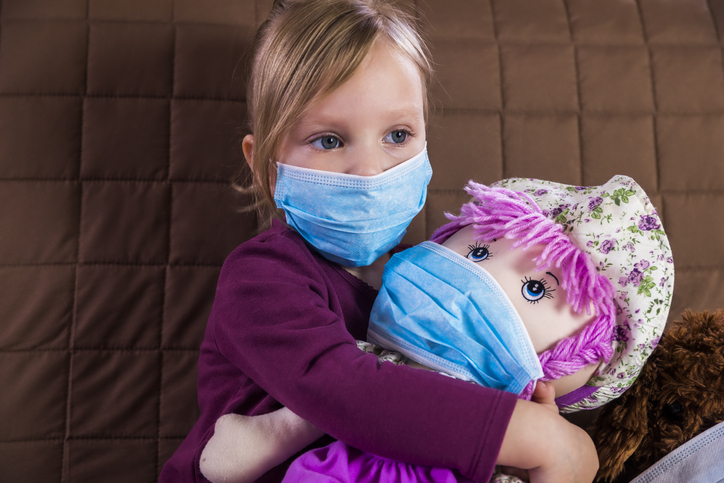Several states are issuing mandates for children ages 2 to 4 to wear face masks in public settings, including in daycare and learning centers.
A number of states require adults to make a “good faith effort” to mask up toddlers. As of April 28, following updated guidance from the Centers for Disease Control and Prevention (CDC), California, Connecticut, the District of Columbia, Illinois, Maine, Michigan New Jersey, New York, Ohio, Pennsylvania, Rhode Island, and Vermont encourage toddler masks. Regardless of state, toddlers are required to wear masks while on airplanes and on public transportation, just like adults, under an order by the Biden administration.
The April 16 policy signed by Michigan Gov. Gretchen Whitmer and updated May 6 relies on the CDC guidelines and data based on transmission and severity in older generations, not the impacted age group. Although many states have removed masks altogether, Whitmer suggested she may remove mask orders if more people in the state receive COVID-19 vaccinations.
“Now while I can’t predict with certainty when we’ll hit 70 percent, if we all do our part, I know we can get there together,” Whitmer said during a news conference on April 29.
Thirty-nine percent of Michigan’s residents are fully vaccinated.
Where’s the Science?
Children under age 9 account for 11.5 percent of Michigan’s population and, as of April 13, made up 3.7 percent of COVID-19 cases in the state and less than 0.1 percent of the deaths from the virus. Of children who have become sick with COVID-19, one percent were under the age of 4. Multiple international studies have supported evidence that the virus’s impact on children is negligible.
“This latest tweak to the governor’s orders is not supported by evidence or theory,” said Michael Van Beek, the director of research at the Mackinac Center for Public Policy in Michigan. “Toddlers are not and never have been drivers of COVID-19 transmission. Evidence for that started piling up about a year ago. Why the governor chooses now to impose this hopeless policy change on Michigan is stupefying.”
Whitmer is facing backlash for her far-reaching policies. In late April, the state Bureau of Elections legally certified a petition known as “Unlock Michigan” to move forward after it obtained 460,000 signatures, one hundred thousand more than the required amount.
Enough is Enough
In response to the increase in restrictions, Sen. Mike Lee (R-UT), Rep. Jason Smith (R-MO), and 30 other legislators published a bicameral letter to the CDC on April 22.
The letter, addressed to CDC Director Rochelle Walensky, highlights numerous cases of American parents being removed or banned from travel due to a toddler’s failure to wear a mask properly.
Furthermore, “For parents of children with disabilities, compliance has proved almost impossible, resulting in increased social isolation and negative mental health consequences,” the letter reads.
“Children under 4 years have small airways and wearing a mask may lead to higher airway resistance making it harder to breathe, particularly in the summer heat,” said Marilyn M. Singleton, MD, JD. “Further, some brands of masks have fiberglass fibers which may drift into their small lungs. Moreover, practically speaking, the mask will be filthy after a few minutes of typical playtime of young children. The accumulated bacteria will no doubt be inhaled into the upper airways and lungs.”
Jay Bhattacharya, M.D., an economist, and professor at medicine at Stanford Medical School, spoke out unanimously against child masking in a public policy roundtable in Florida in March.
In Wall Street Journal op-ed published April 13, Bhattacharya explained that his reasoning followed a “cost-benefit” analysis because numerous studies point to children being low-risk for disease symptoms and transmission. Additionally, a growing body of medical evidence proves that masking negatively impacts children’s psychosocial and learning development, a concern published in the World Health Organization’s guidelines for masking children under age 11.
“I place an enormous value on children flourishing,” Bhattacharya writes in the op-ed.
YouTube pulled a video of the Florida discussion, citing “misinformation” by the panel.
“YouTube’s action violates basic standards of scientific conduct,” Bhattacharya wrote. “If YouTube wants to argue that we were wrong, it has an obligation to show its evidence.”
Ashley Bateman (bateman.ae@googlemail.com) writes from Virginia.
